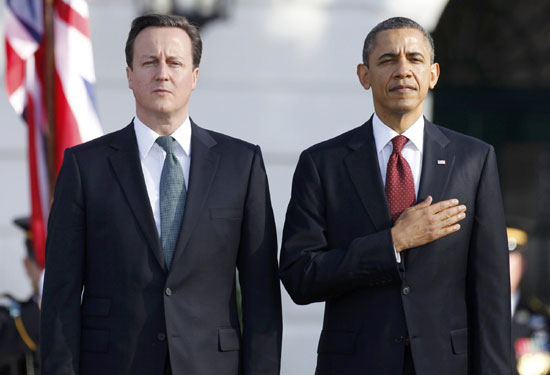
WASHINGTON - British Prime Minister David Cameron on Wednesday claimed "important progress" on "four vital areas" - Afghanistan, Syria, Iran and economic growth - in his talks with US President Barack Obama at the White House.
Washington has also made optimal use of the visit to show solidarity and a "special relationship" on track between the two countries.
However, analysts said the "special relationship" is not what it used to be under the changing circumstances.
Cameron's three-day visit came at a crucial moment when issues like Afghanistan, Iran and Syria have been heating up.
 |
|
US President Barack Obama and British Prime Minister David Cameron (L) listen to the US national anthem on the South Lawn of the White House in Washington, March 14, 2012. [Photo/Agencies] |
He had a one-on-one meeting with Obama at the Oval Office before others joined in, and they chose to use a joint press conference to show their solidarity and common ground.
Cameron declared that he had "excellent" discussions with Obama, and that they made "important progress" on Afghanistan, Syria, Iran and economic growth.
On Afghanistan, a series of events, including the recent killing of 16 civilians by an American soldier, have put the NATO-led coalition forces in a more delicate situation and the planned withdrawal timetable into question.
Meanwhile, latest polls showed growing public weariness in both countries over the decade-old war, as Obama is facing an uphill struggle for re-election.
With their countries being the two largest contributors of forces to the Afghan mission, both Obama and Cameron pledged to adhere to the agreed transition plan and determine the next phase of transition when NATO leaders meet in Chicago on May 20-21.
"We're going to complete this mission and we're going to do it responsibly," Obama remarked.
"In terms of pace, I don't anticipate at this stage that we're going to be making any sudden additional changes to the plan that we currently have," he said.
On Iran, Cameron voiced support for Obama's diplomatic approach, as the president said they believe "there is still time and space" to pursue a diplomatic solution.
Last week, Israeli Prime Minister Benjamin Netanyahu told Obama at the White House that he had not yet made a decision on a unilateral military strike on Iran's nuclear facilities, but that Israel has a sovereign right to make its own decisions.
Obama warned Iran that "The window for solving this issue diplomatically is shrinking."
Turning to Syria, the pair said they were focusing on getting humanitarian aid to those in need, and intensifying the pressure at the same time for President Bashar al-Assad to step down for a political transition in the country.
Cameron warned that if Assad continues the killing, "then civil war or revolution is the inevitable consequence." But he and Obama ruled out a Libya-style military intervention in the Arab nation.
While sharing the same goal of growth and low deficits, the two leaders have adopted different approaches to their economic woes: Cameron is axing spending on an unprecedented level, while Obama is promoting more spending.
They tried to play down their differences, with Cameron arguing that different national circumstances warrant different measures.